 W
WA bar, also known as a saloon, a tavern or tippling house, or sometimes as a pub or club, is a retail business establishment that serves alcoholic beverages, such as beer, wine, liquor, cocktails, and other beverages such as mineral water and soft drinks. Bars often also sell snack foods, such as crisps or peanuts, for consumption on their premises. Some types of bars, such as pubs, may also serve food from a restaurant menu. The term "bar" refers to the countertop where drinks are prepared and served, and by extension to the overall premises.
 W
WA beer garden is an outdoor area in which beer and food are served, typically at shared tables.
 W
WA beer hall is a large pub that specializes in beer.
 W
WA biker bar is a bar that is frequented by motorcyclists (bikers). Some are owned or managed by people who are friendly toward motorcyclists. Some bars and restaurants advertise that they are "biker friendly" to attract more bikers and motorcycle (bike) enthusiasts. Biker bars are patronized by people from all walks of life, including bikers, non-bikers, and motorcycle club adherents, including outlaw motorcycle clubs.
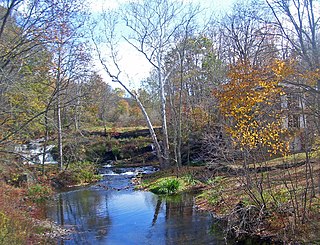 W
WThe Bloomvale Historic District is located east of the hamlet of Salt Point, New York, United States. It is a collection of buildings and structures around the intersection of Clinton Corners Road, state highway NY 82 and the East Branch of Wappinger Creek. Most of it is in the Town of Pleasant Valley; the eastern portion is in the Town of Washington.
 W
WA craft brewery or microbrewery is a brewery that produces small amounts of beer, typically less than large breweries, and is often independently owned. Such breweries are generally perceived and marketed as having an emphasis on enthusiasm, new flavours, and varied brewing techniques.
 W
WA cantina is a type of bar common in Latin America and Spain. The word is similar in etymology to "canteen", and is derived from the Italian word for a cellar, winery, or vault. In Italy, the word cantina refers to a room below the ground level where wine and other products such as salami are stored.
 W
WA chiringuito is a small enterprise, usually a bar, selling mainly drinks and tapas, and sometimes meals, in a more or less provisional building, often on a beach or loose surface where a more permanent structure may be inviable. There are two main variants:Those found on beaches or at tourist attractions, which enjoy only brief but intense seasonal activity. These can be solid structures but are more often no-frills shelters or simply stalls capable of commanding a price premium compared to regular suppliers, as well as high turnover, yielding reasonable profits over a short span of time. Particularly in Andalucia and increasingly also much of Spain, such installations are a popular feature of markets, fiestas, the so-called 'ferias' like the Seville fair, and eventos, where they are called casetas since they often trade out of standardized prefabricated wooden boxes routinely set up in streets and town squares.
 W
WA Cuca shop is a Southern African term for a "Shebeen"—an unlicensed house selling alcoholic liquor.
 W
WEl Rio is a gay bar located at 3158 Mission Street, San Francisco, California. It was the first gay bar to debut queer salsa in San Francisco. El Río was established in 1978 as a Leather Brazilian Gay Bar and has been recognized as a Legacy Business by the San Francisco Small Business Commission. El Rio is best known for supporting the community by providing a space for community gatherings, LGBT performances, diverse forms of music and dancing, and offering a space for community fundraising events.
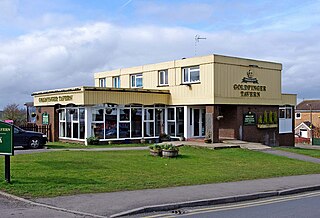 W
WIn the United Kingdom and Ireland, a flat-roofed pub is a public house with a flat roof, often located on housing estates. They are frequently of concrete construction, with flat roofs rather than more conventional pitched roofs.
 W
WA gay bar is a drinking establishment that caters to an exclusively or predominantly lesbian, gay, bisexual, and transgender (LGBT) clientele; the term gay is used as a broadly inclusive concept for LGBTQ+ communities.
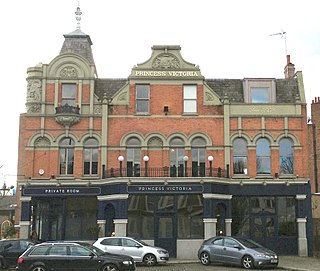 W
WA gin palace is an English name originally for a lavish bar selling gin, later transferred by association to late Victorian pubs designed in a similar style.
 W
WIn eastern Austria, a Heuriger is a tavern where local winemakers serve their new wine under a special licence in alternate months during the growing season. The Heurige are renowned for their atmosphere of Gemütlichkeit shared among a throng enjoying young wine, simple food, and - in some places - Schrammelmusik. They correspond to the Straußwirtschaften in the German Rheinland, the Frasche in Friuli-Venezia Giulia, and Osmica in Slovenia.
 W
WA honky-tonk is both a bar that provides country music for the entertainment of its patrons and the style of music played in such establishments. It can also refer to the type of piano used to play such music. Bars of this kind are common in the South and Southwest United States. Many eminent country music artists, such as Jimmie Rodgers, Loretta Lynn, Patsy Cline, Ernest Tubb, Johnny Horton, and Merle Haggard, began their careers as amateur musicians in honky-tonks.
 W
WAn ice bar, sometimes associated with an ice hotel, is a drinking establishment primarily made of ice. The bars usually contain ice sculptures and other formations and are kept at low temperatures to hinder melting. The walls and seating are also usually made of ice. Mostly a novelty, the ice bar is often considered a tourist destination. Visitors enter for timed stays and even staff work on time-limited shifts. The most popular drinks served at ice bars are ice-cold vodka shots, or cocktails mixing vodka with a berry puree.
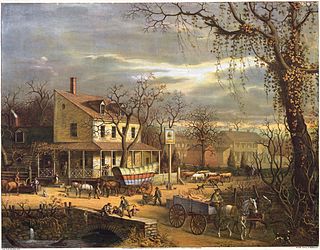 W
WInns are generally establishments or buildings where travelers can seek lodging, and usually, food and drink. Inns are typically located in the country or along a highway; before the advent of motorized transportation they also provided accommodation for horses.
 W
WAn Irish pub is an establishment licensed to serve alcoholic drinks for consumption on the premises. Irish pubs are characterised by a unique culture centred around a casual and friendly atmosphere, hearty food and drink, Irish sports, and traditional Irish music. Their widespread appeal has led to the Irish pub theme spreading around the world.
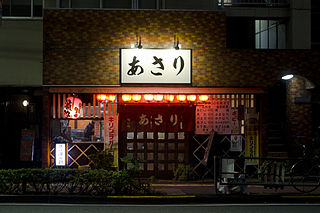 W
WAn izakaya is a type of informal Japanese bar that serves alcoholic drinks and snacks. Izakaya are casual places for after-work drinking, similar to a British or Irish pub, Spanish tapas bar, and American saloon and tavern.
 W
WJuke joint is the vernacular term for an informal establishment featuring music, dancing, gambling, and drinking, primarily operated by African Americans in the southeastern United States. A juke joint may also be called a "barrelhouse".
 W
WIn old Korean society, a Jumak was a kind of tavern or inn that served alcoholic beverages and food and also provided lodging to travellers. It was also called jusa, juga, or jupo. While it is unknown when jumak first came into existence, historical documents show that a kisaeng, Cheongwan (天官), operated one. According to Samguk Yusa, a general of the Silla Kingdom, Kim Yu-sin, frequented the place when he was young. Other sources assume jumak first appeared in 1097 during King Sukjong's reign in the Goryeo Dynasty.
 W
WA lesbian bar is a drinking establishment that caters exclusively or predominantly to lesbian women. While often conflated, the lesbian bar has a history distinct from that of the gay bar.
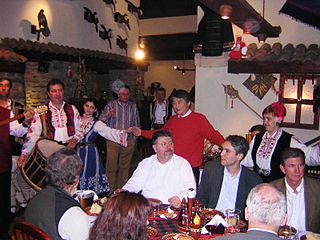 W
WA meyhane is a traditional restaurant or bar in Turkey, Azerbaijan, Iran and the Balkans. It serves alcoholic beverages like wine, rakı, vodka, beer with meze and traditional foods. "Meyhane" means house of wine and is composed of two Persian words: mey (wine) and khāneh (house). The word entered the Serbian and Bulgarian languages as mehana and in Macedonian as meana. In Bosnian language the word "mejhana" is used. A meyhane used to serve mainly wine alongside meze until the late 19th century when rakia established itself as the quasi-official national drink of Bulgaria. In Serbia, the word mehana is considered archaic, while in Bulgaria it refers to a restaurant with traditional food, decoration and music.
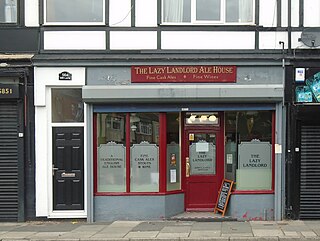 W
WA micropub is a very small, modern, one room pub founded on principles set up by Martyn Hillier of the first micropub, The Butchers Arms in Herne, Kent, which are "based upon good ale and lively banter".
 W
WA night-cellar is a cellar which is open for business at night, typically providing food, drink and entertainment. There were many such in London in the 18th century and they were often disreputable.
 W
WA nightclub is an entertainment venue during nighttime comprising a dance floor, lightshow, and a stage for a disc jockey (DJ) where a DJ plays recorded music.
 W
WAn ouzeri is a type of Greek tavern which serves ouzo and mezedes.
 W
WAn oyster bar, also known as an oyster saloon, oyster house or a raw bar service, is a restaurant specializing in serving oysters, or a section of a restaurant which serves oysters buffet-style. Oysters have been consumed since ancient times and were common tavern food in Europe, but the oyster bar as a distinct restaurant began making an appearance in the 18th century.
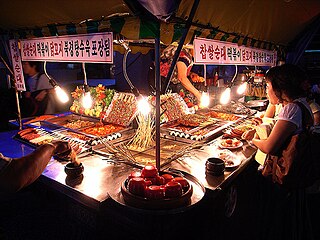 W
WPojangmacha is form of commercial establishment based out of a small tent or street stall found in South Korea. These establishment sell popular street foods, such as hotteok, gimbap, tteokbokki, sundae, dakkochi , odeng, mandu, and anju. In the evening, many of these establishments serve alcoholic beverages such as soju. Pojangmacha literally means "covered wagon" in Korean.
 W
WA pub is an establishment licensed to serve alcoholic drinks for consumption on the premises. The term public house first appeared in the late 17th century, and was used to differentiate private houses from those which were, quite literally, open to the public as 'alehouses', 'taverns' and 'inns'. By Georgian times it had become common parlance, although taverns, as a distinct establishment, had largely ceased to exist by the beginning of the 19th century. Today, pubs have no strict definition, but CAMRA states a pub has four characteristics:is open to the public without membership or residency serves draught beer or cider without requiring food be consumed has at least one indoor area not laid out for meals allows drinks to be bought at a bar
 W
WPulquerías are a type of tavern in Mexico that specialize in serving an alcoholic beverage known as pulque. Established during early colonial rule, pulquerías remained popular venues for Mexican socializing until the mid-20th century. They were associated with extravagant decorations and names, social drinking, music, dancing, gambling, fighting, crime, and sexual promiscuity. Central to daily life and culture in Mexico, government authorities throughout history generally saw them as threats to the social order and the progress of the nation. Numerous restrictions were later put on pulquerías and the sale of pulque. Today, there are very few pulquerías left operating in Mexico.
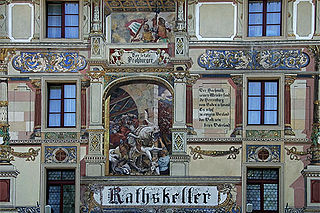 W
WRatskeller is a name in German-speaking countries for a bar or restaurant located in the basement of a city hall (Rathaus) or nearby. Many taverns, nightclubs, bars, and similar establishments throughout the world use the term.
 W
WA sagardotegi is a type of cider house found in the Basque Country where Basque cider and traditional foods such as cod omelettes are served. Modern sagardotegis can broadly be described as a cross between a steakhouse and a cider house.
 W
WSchanigarten is the Austro-Bavarian term for tables and chairs set up on the sidewalk in front of eating and drinking places. Unlike normal beer gardens (Gastgärten), the customers actually sit on public property. Originally, Schanigärten referred only to Viennese coffee houses, but now the expression is used in other parts of Austria and for other types of establishments like restaurants and taverns.
 W
WA shebeen was originally an illicit bar or club where excisable alcoholic beverages were sold without a licence. The term has spread far from its origins in Ireland, to Canada, the United States, the United Kingdom, Zimbabwe, the English-speaking Caribbean, Namibia, Malawi, and South Africa. In modern South Africa, many shebeens are now fully legal.
 W
WA snack bar usually refers to an inexpensive food counter that is part of a permanent structure where snack foods and light meals are sold.
 W
WA Strausse or Strausswirtschaft is a type of wine tavern in winegrowing areas of German-speaking countries that is only open during certain times of the year. Typically it is a pub run by winegrowers and winemakers themselves, in which they sell their own wine directly to the public. The food served needs to be simple, regional cold dishes. Other expressions like Besenwirtschaft and Besenschänke, Rädlewirtschaft as well as Hecken- or Häckerwirtschaft are also common.
 W
WA tavern is a place of business where people gather to drink alcoholic beverages and be served food, and where travelers would receive lodging. An inn is a tavern that has a license to put up guests as lodgers. The word derives from the Latin taberna whose original meaning was a shed, workshop, stall, or pub.
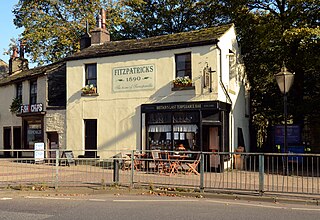 W
WA temperance bar, also known as an alcohol-free bar, sober bar, or dry bar, is a type of bar that does not serve alcoholic beverages. An alcohol-free bar can be a business establishment or located in a non-business environment or event, such as at a wedding. Alcohol-free bars typically serve non-alcoholic beverages, such as non-alcoholic cocktails known as mocktails, alcohol-free beer or low-alcohol beer, alcohol-free wine, juice, soft drinks and water. Popular temperance drinks include cream soda, dandelion and burdock, sarsaparilla, and Vimto, among others. Various foods may also be served.
 W
WIn the United Kingdom, a tied house is a public house required to buy at least some of its beer from a particular brewery or pub company. That is in contrast to a free house, which is able to choose the beers it stocks freely.
 W
WA tiki bar is a themed drinking establishment that serves elaborate cocktails, especially rum-based mixed drinks such as the Mai Tai and Zombie cocktails. Tiki bars are aesthetically defined by their tiki culture décor which is based upon a romanticized conception of tropical cultures, most commonly Polynesian. Some bars also incorporate general nautical themes or retro elements from the early atomic age.
 W
WA toddy shop is a drinking establishment seen in some parts of India where palm toddy, a mildly alcoholic beverage made from the sap of palm trees, is served along with food.
 W
WA Western saloon is a kind of bar particular to the Old West. Saloons served customers such as fur trappers, cowboys, soldiers, lumberjacks, businessmen, lawmen, outlaws, miners, and gamblers. A saloon might also be known as a "watering trough, bughouse, shebang, cantina, grogshop, and gin mill". The first saloon was established at Brown's Hole, Wyoming, in 1822, to serve fur trappers.
 W
WA wine bar is a tavern-like business focusing on selling wine, rather than liquor or beer. A typical feature of many wine bars is a wide selection of wines available by the glass. Some wine bars are profiled on wines of a certain type of origin, such as Italian wine or Champagne. While many wine bars are private "stand-alone" establishments, in some cases, wine bars are associated with a specific wine retailer or other outlet of wine, to provide additional marketing for that retailer's wine portfolio. In countries where licensing regulations allow this, some wine bars also sell the wines they serve, and effective function as a hybrid between a wine shop and a wine bar.
 W
WZoigl is a type of German beer brewed in the Oberpfalz, eastern Bavaria, between Franconia and the Czech Republic.